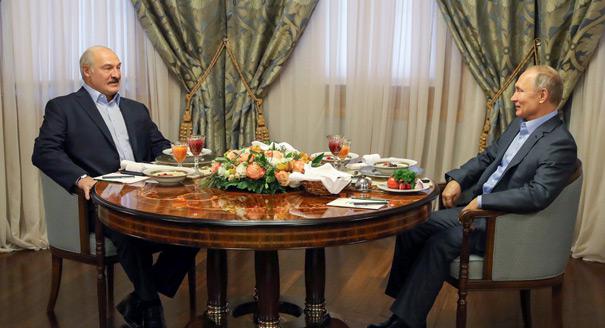Any hopes that the friendship between Russia and Belarus could be salvaged were dashed by their two presidents’ energy prices summit on February 7 in Sochi. Minsk has run out of options for persuading Moscow to return to the old model of relations.
Belarusian President Alexander Lukashenko called this meeting a moment of truth. He and Vladimir Putin have maintained a façade of friendly relations over the past twenty years, but the facts tell a different story. Before the start of the meeting, Putin offered Lukashenko a bowl of oatmeal. Lukashenko was reluctant to take it, as the oatmeal was cooked with water instead of milk. “Try it, you will like it,” said Putin, in what looked like a metaphor for their relationship.
At the Sochi meeting Lukashenko failed to secure either a discount on crude oil or compensation for Russia’s “tax maneuver,” an end to crude oil export duties that has left Belarus—which used to buy crude from Russia and export it to other countries at a higher price—out of pocket. The two sides agreed to keep last year’s gas price of $127 per 1,000 cubic meters, but this is a temporary solution to the dispute, and far from the terms that Minsk had sought: Belarus had insisted that as a member of an economic union with Russia, it should be able to buy gas at Russian domestic prices.
This means that Minsk is now losing the cheap energy benefits it used to enjoy with Moscow. The consequences will be serious. First of all, the dialogue over road maps for the long-discussed further integration of Russia and Belarus will either be buried once and for all or indefinitely postponed.
Without discounted oil and gas from Russia, the integration process loses all its value for Minsk. For the Belarusian side, it was only ever about economic bonuses. Moscow’s promise that it would restore these advantages after the integration road maps were implemented could not persuade Minsk to change its national laws for the purposes of alignment.
Second, Belarus will have to tighten its belt. Gasoline prices will have to rise. Minsk will likely buy less oil now, which means it will sell fewer petrochemicals. This will cause exports to tumble, and GDP to at best stagnate, or even contract.
The Belarusian budget will continue to suffer losses from Russia’s tax maneuver. The country will have to cover this deficit either via external borrowing and tax increases, or by cutting spending on social services and support for the state sector, or by drawing on its gold and foreign currency reserves. Most likely we will see some of these unpleasant measures in 2020.
It looks as though Minsk will have no choice but to agree to prices set by Russian oil companies. At the same time, it will look for alternative non-Russian sources of oil, even though they will be more expensive. This is not just a matter of pride; it’s also a pragmatic move to work out the logistics of oil deliveries by 2024, when Belarus will have to pay the global price for Russian crude.
This situation will push Lukashenko not only toward economic reforms but also to position himself more proactively at home as a protector of his nation’s sovereignty. He will likely assume this role going into the presidential elections this summer.
In addition, Lukashenko will return to his foreign policy balancing act with renewed vigor. If Moscow doesn’t like the kind of relationship Minsk is building with Ukraine, the EU, or the United States, Lukashenko has a ready excuse: “You drove us to this.”
There is no foreseeable risk to Belarus’s unions with Russia. Leaving the Eurasian Economic Union (EEU), the Collective Security Treaty Organization (CSTO), or the Union State would only worsen Belarus’s economic problems.
Improving relations with the West won’t be easy for Minsk either. Regardless of geopolitical calculations, as long as Belarus remains an authoritarian state, the door to the West is closed. It will be hard to get sanctions fully lifted, never mind achieve a full-fledged political or trade rapprochement with the EU and the United States.
There may, however, be more visits and friendly rhetoric. Over the next few years, Minsk could well build a relationship with the West like that of Armenia or Kazakhstan. Those countries, although they are members of the CSTO and EEU, have signed substantial bilateral agreements with Washington and Brussels.
There are two risks here. First, Moscow will be more upset by Minsk flirting with the West than by such behavior from its southern neighbors. This may spark a backlash from parts of the Russian elite and media.
Second, the Belarusian president himself could well escalate the crisis through some of his trademark emotional statements. This might even be a partially deliberate tactic aimed at making Moscow scared of losing its ally.
Lukashenko has already dropped several hints along these lines, saying that Russia does not appreciate the fact that it has military sites housed on Belarusian territory free of charge, or that the Druzhba pipeline carrying oil from Russia to Europe might suddenly be required by Minsk for reverse deliveries from Poland.
The one thing that is definitely not on the table in the relationship is the possibility of returning to their previous friendship. The two countries are irrevocably set on a path of cooler and more pragmatic relations. This process may result in a situation that is healthier for both sides, but it’s unlikely to be without incident.
